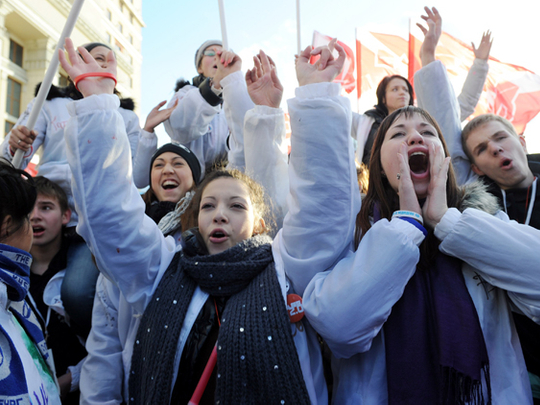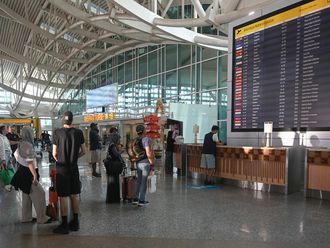
Moscow: Russian bloggers on Tuesday hailed the success of a rarely-seen "Facebook" rally where thousands protested against elections won by Vladimir Putin's ruling party and warned of more demonstrations to come.
Several thousand mostly young demonstrators braved freezing rain late Monday to show their frustrations over Sunday's legislative elections that handed a narrow victory to the Russian prime minister's party despite claims of fraud.
Not broadcast
The event never made it on the state TV news but was debated across Russia's rapidly spreading Internet as bloggers swapped news of arrests and posted videos of election violations.
"The Facebook revolution," said the private Dozhd (Rain) television that broadcasts mainly through the Internet and was one of the few Russian channels to closely follow the protests.
"Nothing like this has ever happened before," journalist Sergei Parkhomenko told the website.
"This all started with a few posts on Facebook and (blogging platform) LiveJournal."
Detainees
Those detained in Monday's protest included the whistleblower Alexei Navalny - a growing Internet celebrity whose arrest was confirmed by his wife on his blog and quickly drew more than 2,500 comments.
News that fellow organiser Ilya Yashin had been handed a 15-day jail sentence for disobeying police orders prompted one blogger to comment:
"That means there will definitely be more protests." Several websites soon reported that the next rally against Putin had been called in Moscow for 7:00 pm (1500 GMT) while bloggers from other major cities across central Russia tried to organise their own events.
The Internet chatter even prompted a stern warning from the Moscow police for people "not to fall victim to provocations" spreading across the Inernet.
Largest demonstration in years
Monday's anti-Kremlin demonstration was one of the largest witnessed in Moscow in years and included many who admitted to have never before joined opposition calls to come out on the streets.
"The most important outcome of yesterday's rally is that it not only drew people who usually come out to such events, but also those who never attend them," wrote LiveJournal's most followed Russian blogger drugoi (other).
"That is what people in the crowd were saying - we are not for your Solidarity (opposition movement), we are against Putin and his United Russia." Much of the criticism against the authorities was laced with the bitter humour that characterised popular culture in the strictest of Soviet times.
"The falsifications passed smoothly," one popular Internet joke read. "No voting reported amid the violations."
Another featured a photo showing a broadly grinning President Dmitry Medvedev shaking hands with the bearded head of the Russian election commission Vladimir Churov.
"Thank you grandpa for the victory!" read the caption in a play on a famous Russian poster honouring World War II veterans.
Even a message from Medvedev thanking Russians for their support drew insults on his official Twitter account. "What support? No one supported you... except for Churov and his magic maths," wrote opposition blogger Roman Dobrokhotov.
Ashamed
"Are you not ashamed?" wrote another blogger. Analysts said the Internet was gradually changing the political perceptions of Russians who have become accustomed to a media that had spent much of the past decade carefully toeing the Kremlin line.
"The Internet played a very important and possibly decisive role in changing people's attitudes toward elections," said independent political analyst Dmitry Oreshkin.
"The number of actual violations may not have grown, but people's response to them was much stronger."












